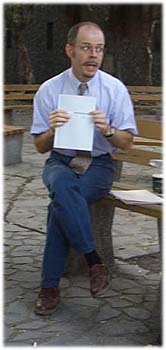|
 |
 |
|

|
1. 入門︰How do you teach a poem to make Taiwanese students like it?
2. 指引︰What if some students just don''t get it?
3. 時間安排︰When do you introduce the poem''s poetic form, its rhyme scheme or its related historical background?
| 1. How do you teach a poem to make Taiwanese students like it? |
There are two general principles that I follow: I have to teach what I like, and I usually start with getting students'' own responses. I may not teach what I "love" personally, because I''d feel bad if students don''t like it. But I have to teach the poems I like and have a lot to say about. However, when I teach, I don''t mind not expressing all of my ideas. In the first 5 to 10 minutes of class, I ask students to talk about what they think, what interests them and what questions they have. Usually, I will write down their points on the white board; I like them to keep on talking, while I fill up the whole white board with their ideas and questions.
It is not difficult to start with their own experience. For instance, in teaching "I Asked my Mother to Sing," students certainly have a lot to say about their experience of singing in a group of friends or family members with the Karaoke machines. Then I will ask them talk more about the poem, give them some questions to go on discussing their ideas, or ask them to question one another. If the whole class gets engaged in some debate, I will literally go to the back row of the classroom and let them talk.
I like it when the class is "chaotic" with all sorts of ideas. However, in the middle of the class, there is usually a turning point, when some of the questions I ask get students to look at the poem from another perspective.
TOP
|
| 2. I guess this is how you manage to direct students to go deeper into a poem. What if some students just don''t get it? Or when their interpretation is simply wrong? |
If only one or two talk, I will follow up on what the few students have said and then try to engage more students. If some students say something definitely wrong about a poem (for instance, saying that "The Red Wheelbarrow" by William Carlos Williams is about atomic bomb), I will ask them to backtrack, to go back to reading the poem closely. I like to use the metaphor Frost uses in "The Birches": I believe that a poem, like a birch, always starts from the earth. While some students may have swung high with a poem, some others may not know where to start. In that case, it''s better to go back down to earth. Sometimes, and especially with freshmen, this means that I need to paraphrase the poem I teach, or ask them to paraphrase it. But oftentimes it means reading a poem out loud and getting students to pay attention to some details of the poem.
TOP
|
| Q: In responding to students who offer "wrong" interpretation, do you say directly that they are wrong? Do you worry that students may miss some important aspects of a poem? |
I tried not to say that a student is wrong. But sometimes we just joke about the mistakes. Getting students to be able to laugh at their own mistakes is one way to make them relaxed and open in talking about their ideas.
Yes, there are some aspects of a poem I don''t want students to miss. For instance, the pauses and hesitation in the last stanza of "One Art":
--Even losing you (the joking voice, a gesture
I love) I shan''t have lied. It''s evident
the art of losing''s not too hard to master
though it may look like (Write it!) like disaster.
However, I don''t need to say everything. I only ask them to think more about the parenthetical expression in the first two lines and the pause in between these two lines, and then they will pick up the efforts and energies in the speaker''s forcing out "(Write it!)" in the last line.
TOP
|
3. When do you introduce the poem''s poetic form, its rhyme scheme or its related historical background?
|
Usually towards the last 10 minutes of a class. But poetic form is not just something mechanical; the way a certain form produces meanings and sound effects should have been discussed before the details of such form is introduced.
|
| Q. How long does it take you to finish reading a poem with graduate students? Do you worry about not finishing the poems on the syllabus? |
Sometimes it can take three hours for me and graduate students to talk about one poem. In one week, I ask them to read twelve poems, but we just focus on one poem in class. I ask them to write on one or two of the others in their reading journal (or "Dear Ray" letter). It always amazes me what poems students choose to write on in their journals and in their term papers.
TOP
|
| |
|
|
|
|
